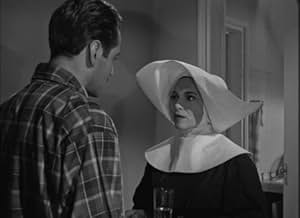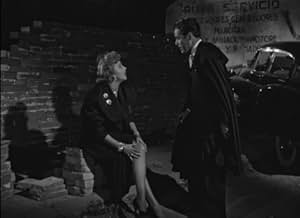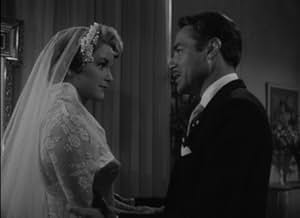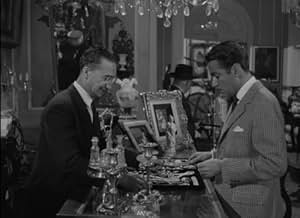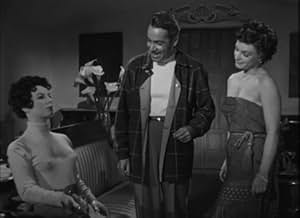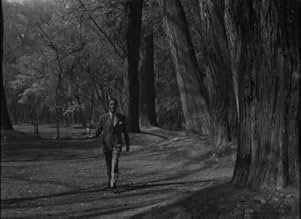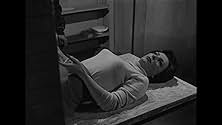VALUTAZIONE IMDb
7,6/10
6242
LA TUA VALUTAZIONE
Il viaggio delirante di un uomo con disturbi mentali, ossessionato dal compiere il crimine perfetto.Il viaggio delirante di un uomo con disturbi mentali, ossessionato dal compiere il crimine perfetto.Il viaggio delirante di un uomo con disturbi mentali, ossessionato dal compiere il crimine perfetto.
- Regia
- Sceneggiatura
- Star
- Premi
- 1 vittoria e 8 candidature totali
Ariadne Welter
- Carlota Cervantes
- (as Ariadna Welter)
José María Linares-Rivas
- Willy Corduran
- (as J.M. Linares Rivas)
Enrique Díaz Indiano
- Señor de la Cruz
- (as Enrique Indiano)
Carlos Martínez Baena
- Padre Alonso
- (as Carlos M. Baena)
Armando Acosta
- Hombre casa juegos
- (non citato nei titoli originali)
Eduardo Alcaraz
- Gordo Azuara
- (non citato nei titoli originali)
Janet Alcoriza
- Turista de Oklahoma
- (non citato nei titoli originali)
Recensioni in evidenza
In the 50's, in Mexico, Archibaldo de la Cruz (Ernesto Alonso) comes to a judge to confess crimes of his own. He tells his life since he was a spoiled boy, in the days of the Mexican revolution, when he won a music box from his mother and developed a bizarre desire of killing women, becoming a serial killer. In the end, this movie is a psychological dark comedy of the Mexican phase of Buñuel. I have just had the chance to see this film on DVD, recently released by the best Brazilian distributor (Versátil), and I found it another excellent work of Buñuel, one of my favorite directors ever. The story is very ironic and unpredictable, and I totally disagree with the User Comments `Minor Buñuel' indicated for this film. My vote is nine.
Title (Brazil): `Ensaio de um Crime' (`Rehearsal for a Crime')
Title (Brazil): `Ensaio de um Crime' (`Rehearsal for a Crime')
Again, Bunuel explores the disturbing mentality of a member of the privileged class. The premise is very amusing: a would-be serial killer whose attempts are constantly thwarted by circumstance. The film has some wonderful touches like the demented music box theme, the fantasies when Archie gets in one of his murderous moods, and again a focus on the lower half of the female form. Ernesto Alonso and the entire cast are terrific. However, the film does have a certain sluggishness to it, and the first two acts in particular seem to contain a lot of superfluous material that doesn't add much to the whole. I also feel the ending could use more of a cynical bite to it. Still, it's better than a lot of his 50's work, if not quite as remarkable as EL or LOS OLVIDADOS.
Following your advice, I recently `relented' to buying from Alapage the two Luis Bunuel Double-Feature discs released in France by Film Sans Frontieres. After watching them in their entirety, I cannot believe that I, who consider Bunuel my all-time favorite director and one of the true masters of the medium, have waited this long to acquire these DVDs. Actually while Alapage listed these DVDs at EUR25.73 on their site, they only cost me EUR21.51 each (excluding EUR12 shipping charges). So, if there is still anybody who has not purchased them yet, now may be the time to do so!
Since I had never watched EL (1952) before, it was the first one to go through my DVD player. It was a chilling parable of an insanely jealous middle-aged man played with acute intensity by Arturo De Cordova. It afforded Bunuel ample opportunity to make practical use of overt Freudian symbolism without lending the film a heavy-handed air of pretentiousness. While there are some critics who consider it as merely `an engaging, minor work', I regard it as being among Bunuel's finest; arguably, with this film, Bunuel reached the culmination of his work in Mexico, but it also looks forward to similar sequences and themes he would tackle later on in his career, especially TRISTANA (1970) and, his last film, THAT OBSCURE OBJECT OF DESIRE (1977).
EL was beautifully abetted by another of his low-budget Mexican films, the great black comedy THE CRIMINAL LIFE OF ARCHIBALDO DE LA CRUZ (1955). Again, critical reception was a bit muted in some circles, dismissing it as `just a throwaway oddity' typical of Bunuel's films of the period. However, it is much more than that: it is certainly very funny if you can accept its macabre sense of humor. It allowed Bunuel to create some of the most memorable images in all of his films, especially the celebrated dummy incineration scene, which could have been "inspired" by a similar scene in Michael Curtiz's marvelous MYSTERY OF THE WAX MUSEUM (1933) which Bunuel must have seen while working at Warner Bros. in the Thirties. A similar instance of this eclectic approach on Bunuel's part can be found in the "walking hand" sequence in his THE EXTERMINATING ANGEL (1962) - one of my favorite Bunuels - which harks back to an identical premise in Robert Florey's THE BEAST WITH FIVE FINGERS (1946), another Warner Bros. horror melodrama. For me, one of the enduring assets of THE CRIMINAL LIFE OF ARCHIBALDO DE LA CRUZ is the charm and great beauty that was Miroslava Stern (who played the part of Lavinia and was the model for the ill-fated dummy). Tragically, she would take her own life a mere two weeks after the film's release with her body, ironically enough, ending up cremated!
Both the print utilized and the transfer for both films were adequate enough, and perfectly acceptable under the circumstances. However, EL's overall visual and aural qualities where distinctly superior to those of ARCHIBALDO which suffered from excessive specks and slight audio dropouts at times, but were never so alarming as to dispel from one's viewing pleasure of the film.
Since I had never watched EL (1952) before, it was the first one to go through my DVD player. It was a chilling parable of an insanely jealous middle-aged man played with acute intensity by Arturo De Cordova. It afforded Bunuel ample opportunity to make practical use of overt Freudian symbolism without lending the film a heavy-handed air of pretentiousness. While there are some critics who consider it as merely `an engaging, minor work', I regard it as being among Bunuel's finest; arguably, with this film, Bunuel reached the culmination of his work in Mexico, but it also looks forward to similar sequences and themes he would tackle later on in his career, especially TRISTANA (1970) and, his last film, THAT OBSCURE OBJECT OF DESIRE (1977).
EL was beautifully abetted by another of his low-budget Mexican films, the great black comedy THE CRIMINAL LIFE OF ARCHIBALDO DE LA CRUZ (1955). Again, critical reception was a bit muted in some circles, dismissing it as `just a throwaway oddity' typical of Bunuel's films of the period. However, it is much more than that: it is certainly very funny if you can accept its macabre sense of humor. It allowed Bunuel to create some of the most memorable images in all of his films, especially the celebrated dummy incineration scene, which could have been "inspired" by a similar scene in Michael Curtiz's marvelous MYSTERY OF THE WAX MUSEUM (1933) which Bunuel must have seen while working at Warner Bros. in the Thirties. A similar instance of this eclectic approach on Bunuel's part can be found in the "walking hand" sequence in his THE EXTERMINATING ANGEL (1962) - one of my favorite Bunuels - which harks back to an identical premise in Robert Florey's THE BEAST WITH FIVE FINGERS (1946), another Warner Bros. horror melodrama. For me, one of the enduring assets of THE CRIMINAL LIFE OF ARCHIBALDO DE LA CRUZ is the charm and great beauty that was Miroslava Stern (who played the part of Lavinia and was the model for the ill-fated dummy). Tragically, she would take her own life a mere two weeks after the film's release with her body, ironically enough, ending up cremated!
Both the print utilized and the transfer for both films were adequate enough, and perfectly acceptable under the circumstances. However, EL's overall visual and aural qualities where distinctly superior to those of ARCHIBALDO which suffered from excessive specks and slight audio dropouts at times, but were never so alarming as to dispel from one's viewing pleasure of the film.
I don't understand why some reviewers call "Criminal Life of Archibaldo De La Cruz" (1955) - "minor" Bunuel. The only "minor" about this (and many his films) is its running time, only 89 minutes but all his films are enigmatic, odd, charming, and always brilliant. I consider Bunuel one of the best and original filmmakers ever and nothing he had done is minor for me.
"Criminal Life of Archibaldo De La Cruz is B/W comedy of Don Luis' Mexican period which is surreal, disturbing, erotic and funny satire about a perverted young wealthy man, an amateur sculptor. Since he was a boy, and one evening witnessed the sudden death of his young attractive governess and became sexually exited by it, Archibaldo De La Cruz dreams of committing a perfect crime of an attractive woman to recreate the feeling but something always prevents him from fulfilling his dreams. It does not mean that the deaths would not occur -it is just that Archibaldo can't take a credit for them. As he often did with his even unlikable and perverse characters, Bunuel gives some of his own sexual fantasies, fetishes, and dreams that he freely admits to Archibaldo thus making him more human and sympathetic.
"Criminal Life of Archibaldo De La Cruz is B/W comedy of Don Luis' Mexican period which is surreal, disturbing, erotic and funny satire about a perverted young wealthy man, an amateur sculptor. Since he was a boy, and one evening witnessed the sudden death of his young attractive governess and became sexually exited by it, Archibaldo De La Cruz dreams of committing a perfect crime of an attractive woman to recreate the feeling but something always prevents him from fulfilling his dreams. It does not mean that the deaths would not occur -it is just that Archibaldo can't take a credit for them. As he often did with his even unlikable and perverse characters, Bunuel gives some of his own sexual fantasies, fetishes, and dreams that he freely admits to Archibaldo thus making him more human and sympathetic.
I have often cited this as my favourite Bunuel film and one of my favourite films of all. Watching it again after a period of some years, I am surprised that it seems so light and amusing instead of dark and dangerous. I suppose this is partly because when first seen the misogyny, the gleefulness at the prospect of killing a woman, is so shocking, that we notice less the playfulness. Whereas on a subsequent viewing we are less affected, having some idea how things pan out. Is this the only Bunuel film with a seemingly happy ending? There are still, of course, many shocking moments, like the bloody/sexy death of the woman looking after him as a child, the whole business concerning the mannequins (that seems burned in my memory for ever) and the most surprising early death of the nun/nurse. Maybe it's partly that when I watched this in my youth I rightly saw it as stunningly original and displaying conduct contrary to that shown elsewhere, whereas now the old cynic in me has been exposed to much more and is smiling throughout with barely a pause for a gasp. Always going to be fun to watch though.
Lo sapevi?
- QuizThe movie was shot in the middle of a big economic crisis for the Mexican cinema. Production was about to be shut down a few times and the famous scene with the mannequin being cremated was filmed only once because they couldn't afford another mannequin.
- BlooperWhen the nun falls down the empty elevator shaft she screams loudly but the sound is obviously that of a man; in fact, it sounds like a Wilhelm Scream.
- ConnessioniFeatured in Miroslava (1993)
I più visti
Accedi per valutare e creare un elenco di titoli salvati per ottenere consigli personalizzati
- How long is The Criminal Life of Archibaldo de la Cruz?Powered by Alexa
Dettagli
- Data di uscita
- Paese di origine
- Lingue
- Celebre anche come
- The Criminal Life of Archibaldo de la Cruz
- Luoghi delle riprese
- Azienda produttrice
- Vedi altri crediti dell’azienda su IMDbPro
- Tempo di esecuzione
- 1h 29min(89 min)
- Colore
- Mix di suoni
- Proporzioni
- 1.37 : 1
Contribuisci a questa pagina
Suggerisci una modifica o aggiungi i contenuti mancanti


